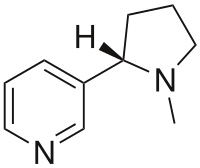
Photo from wikipedia
Nicotine and alcohol co-use is extremely common and their use constitutes two of the most common causes of preventable death, yet the underlying biological mechanisms are largely understudied. Activation of… Click to show full abstract
Nicotine and alcohol co-use is extremely common and their use constitutes two of the most common causes of preventable death, yet the underlying biological mechanisms are largely understudied. Activation of neuroimmune toll-like receptors (TLRs) promotes the induction of proinflammatory cascades and increases alcohol intake in rodents, which further promotes TLRs in the brain; nicotine may decrease central proinflammatory signaling. The current studies sought to determine the effects of nicotine ± alcohol (alone or in combination) on circulating blood plasma and TLR protein/gene expression in addiction-associated corticolimbic brain regions, including the prefrontal cortex-prelimbic (mPFC-PL) and nucleus accumbens core (AcbC). Adult rats were treated with alcohol (0 or 2 g/kg, IG) and exposed to nicotine vapor (0 or 30 mg/mL solution) daily for 2, 14, or 28 days. Plasma studies indicated no effects of independent exposure or coexposure in males. Coexposure decreased plasma nicotine levels versus nicotine-only treated females, yet alcohol and cotinine concentrations were unchanged. By 28 days, the anti-inflammatory cytokine IL-13 was decreased in alcohol-only females. Divergent changes in TLR3 (but not TLR4) protein occurred for independent-drug exposed males (but not coexposure), with reductions in the mPFC-PL after 14 days and increases in the AcbC by 28 days. Gene expression following chronic coexposure suggests nicotine may regionally counteract alcohol-induced inflammation, including increased AcbC-TLR3/4/7 and several downstream markers in females and increased mPFC-PL-TLR3 and -STAT3 (but not IRF3) evident in males with exposure to either drug alone. These findings give further insight into the role of sex and the neuroimmune system in independent exposure and coexposure to nicotine ± alcohol.
Journal Title: ACS chemical neuroscience
Year Published: 2023
Link to full text (if available)
Share on Social Media: Sign Up to like & get
recommendations!